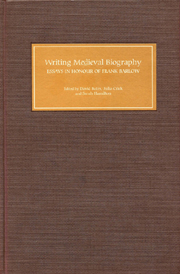Book contents
- Frontmatter
- Contents
- Preface
- List of Abbreviations
- Introduction
- 1 Did Charlemagne have a Private Life?
- 2 Bones for Historians: Putting the Body back into Biography
- 3 ‘Carriers of the Truth’: Writing the Biographies of Anglo-Saxon Female Saints
- 4 Alfred and his Biographers: Images and Imagination
- 5 Re-Reading King Æthelred the Unready
- 6 Writing the Biography of Eleventh-Century Queens
- 7 The Flemish Contribution to Biographical Writing in England in the Eleventh Century
- 8 The Conqueror's Earliest Historians and the Writing of his Biography
- 9 Secular Propaganda and Aristocratic Values: The Autobiographies of Count Fulk le Réchin of Anjou and Count William of Poitou, Duke of Aquitaine
- 10 Reading the Signs: Bernard of Clairvaux and his Miracles
- 11 Arnulf's Mentor: Geoffrey of Léves, Bishop of Chartres
- 12 The Empress Matilda as a Subject for Biography
- 13 The Gesta Stephani
- 14 Writing the Biography of Roger of Howden, King's Clerk and Chronicler
- 15 Writing a Biography in the Thirteenth Century: The Construction and Composition of the ‘History of William Marshal’
- 16 The Strange Case of the Missing Biographies: The Lives of the Plantagenet Kings of England 1154–1272
- Index
4 - Alfred and his Biographers: Images and Imagination
Published online by Cambridge University Press: 12 September 2012
- Frontmatter
- Contents
- Preface
- List of Abbreviations
- Introduction
- 1 Did Charlemagne have a Private Life?
- 2 Bones for Historians: Putting the Body back into Biography
- 3 ‘Carriers of the Truth’: Writing the Biographies of Anglo-Saxon Female Saints
- 4 Alfred and his Biographers: Images and Imagination
- 5 Re-Reading King Æthelred the Unready
- 6 Writing the Biography of Eleventh-Century Queens
- 7 The Flemish Contribution to Biographical Writing in England in the Eleventh Century
- 8 The Conqueror's Earliest Historians and the Writing of his Biography
- 9 Secular Propaganda and Aristocratic Values: The Autobiographies of Count Fulk le Réchin of Anjou and Count William of Poitou, Duke of Aquitaine
- 10 Reading the Signs: Bernard of Clairvaux and his Miracles
- 11 Arnulf's Mentor: Geoffrey of Léves, Bishop of Chartres
- 12 The Empress Matilda as a Subject for Biography
- 13 The Gesta Stephani
- 14 Writing the Biography of Roger of Howden, King's Clerk and Chronicler
- 15 Writing a Biography in the Thirteenth Century: The Construction and Composition of the ‘History of William Marshal’
- 16 The Strange Case of the Missing Biographies: The Lives of the Plantagenet Kings of England 1154–1272
- Index
Summary
Where now are the bones of the famous and wise goldsmith Weland?
ALFRED'S RHETORICAL question from his translation of Boethius's Consolation of Philosophy was meant to point up the transitory nature of human glory and fame. That we are still studying Alfred eleven hundred years later perhaps denies this assumption, but, looked at from a different perspective, the question is quite relevant to the survival of material and textual evidence for early medieval people, even one as famous as Alfred. Finding the bones of King Alfred the Great was, appropriately, the goal of the Hyde Community Archaeology Project's well publicised and fruitless excavation of the Abbey in 1999. As dearly as historians would like to have Alfred's remains to learn some personal details about the man, Alfred's bones are probably no more recoverable than Weland's.
‘Read no history’, a character in Disraeli's novel Contarini Fleming exclaims. ‘Nothing but biography, for that is life without theory.’ It is a good line, but I think completely mistaken. Biographers do not live the lives of their subjects; they create narratives of those lives through selection and analysis of evidence. For modern biographers this often entails selecting what they deem truly germane to the planned narrative from a plethora of information, much as security analysts separate out meaningful intelligence from the ‘noise’ surrounding it. For biographers of early medieval people the problem is dramatically different.
- Type
- Chapter
- Information
- Writing Medieval Biography, 750–1250Essays in Honour of Frank Barlow, pp. 61 - 76Publisher: Boydell & BrewerPrint publication year: 2006



